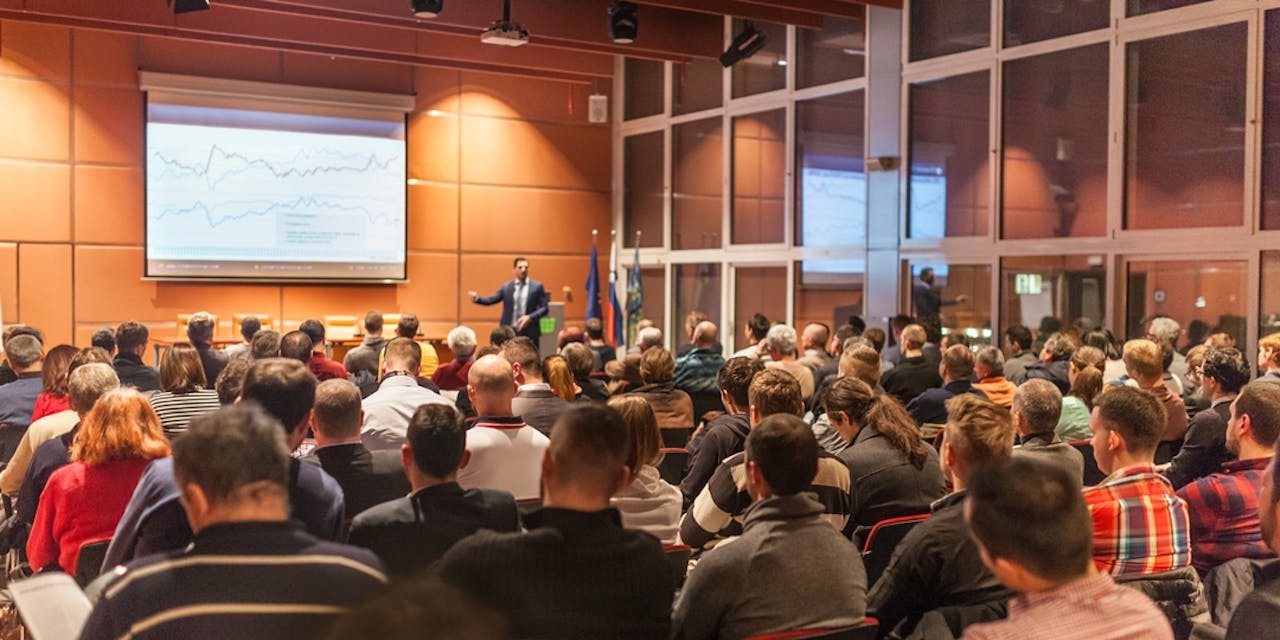Intellifluence
Intellifluence is an all-in-one influencer marketing platform that enables brands and influencers to connect, collaborate and reach their goals.
Skills
Sector Experience
This promoted content is produced by a publishing partner of Open Mic. A paid-for membership product for partners of The Drum to self-publish their news, opinions and insights on thedrum.com - Find out more
Why you should host events to establish influencer authority
August 18, 2022

Concluding our miniseries on influencer marketing strategies within events, today's concept centers around hosting an event. Previous segments in this series include the various ways to use influencer marketing at conferences and trade shows as well as how to become an authoritative influencer by speaking at events.
Earlier in the series, I explained that one of the primary use cases at a conference is that of the organizer. The overall personas of organizers vary, but as explained previously within the context of industry specific events, organizers have the unique opportunity to act as hosts.
Advertisement
What is a hosted event?
A hosted event is almost as straightforward as it sounds. In general terms, it is an organized and structured event which is guided by an organizer. The organizer is playing the role of a host. In some cases, a hosted event also means using one's own working space for the event, going so far as to cover all expenses associated with holding the event. This all-expense, hosted event is often put on by smaller networking associations and can include trade events.
Why host an event?
If you forward this article to your company accountant, they might instinctively reach for the giant red ‘decline’ rubber stamp. However, hosting an event is a powerful concept when employed properly.
What's neat about this tactic is you are bringing your targeted buyer persona to you, which is a way to shortcut into authoritative status, especially if other authoritative influencers invite the audience to your office for the hosted event. Hard selling isn't even required because you are proving you are real, trusted entity and by virtue of playing the role host, are establishing yourself as credible. The law of reciprocity plays an assistive role in that the invitees will want to "pay you back" in some unconscious way.
What is the law of reciprocity?
Distinguished Professor of Marketing at Arizona State University and best-selling author Robert Cialdini coined the concept of reciprocity, which can be distilled as doing something nice for someone and receiving an in-kind gesture of kindness in return. What's intriguing about reciprocity is it does not appear to matter with regards to relative value of the deeds in question.

Hosting an event for a group of potential buyers might cost the organizer $X, whereas the lowest cost offering sold by the organizer may be $X+Y, making the event cost a positive ROI marketing expense. There are limits of course, as the cost of a cup of coffee and a sprinkled donut cannot reasonably be expected to be rewarded with million-dollar contracts. At least not on their own.
Which influencer type explains the role a host plays?
At a minimum, successfully hosting an event should convey a peer level status to the host by the attendees. This is an especially important status to attain for hard-to-reach target markets. The more relevant the host is in context of the businesses of the attendees, the more likely it will occur.
As one can reasonably assume based on the title, the host’s ideal role is to be perceived as an authority. This can occur by proxy through proximity to other known authoritative influencers paid or invited to speak at the event, by adopting the role of a speaker at one’s own event (which we covered), and simply by virtue of hosting a well-branded event if done at a high enough level.
How can you host an event to establish yourself as an authority?
There are several steps to consider when choosing to host an event.
1) Similar to any activity, it’s important to set your goals and KPIs. Therefore, before going any further in the process, determine what you hope to get out of the event, establishing the purpose of the activity.
2) What budget makes sense in the context of your goals? For example, if your KPI is to obtain a certain amount of enterprise leads to follow up on in the next 24 months, how much are those leads worth? The expected worth of those leads and your allowable margin on marketing expenses can then be used to establish an appropriate budget.
3) Determine your attendees. Logically, your attendees are going to be primarily comprised by those individuals that most closely resemble your target buyer persona to help reach your stated goal of the event. Combining the total possible audience mix for the event compared to the budget can help to narrow down the best possible individuals to invite.
4) Establish your “why” for attendance. Corporate buyers are busy people, so there must be some value expectation for them to attend. Will the hosted event be educational in nature with material that cannot be obtained through another event? Will the hosted event be a unique experience that cannot be missed? Does the event offer an opportunity for close networking? The value proposition is very important and once again must tie back to your chosen audience and fit within the confines of your budget.
5) Set the agenda. Having run a few events with the Digital Marketers Organization, this is harder than it sounds. Juggling speaker egos, balancing fun with education, and structuring panels and speaker tracks that will create a fear of missing out if your prospected attendees don’t attend is vital.

The rigidity of the agenda is on a spectrum based on the "why" in step 4; the more of a unique experience, the less structure you’ll need, but always ensure you provide guide rails to keep the event group intact. A bad outcome would be to pay for an expensive Las Vegas event only to have a large percentage of the event group leave to do their own activities, or worse, have them attend after parties hosted by your competitors.
6) Market aggressively. Anyone on the speaker circuit will receive more invites to events than they can logistically attend, yet alone attend and still competently perform in their day jobs. In order to become the signal beyond the noise, you’ll need to stand out. If this is truly a hosted event with a singular corporate appeal, expect to be creating a significant amount of value to these prospective attendees and to highlight that the event will be free or near free as possible. If the budgeting calls for a hard cap on attendance, play to scarcity in your follow-up emails and calls, a first come, first served for other high level and handpicked individuals. As you get your initial commitments, you’ll want to use them as peer influencers to onboard as many of your remaining list of prospects as makes sense.
7.) As should occur in any marketing activity where you properly set a KPI, a marketing post-mortem will be required to assess the outcome of the event. What went correctly? What failed? What can be improved upon for future hosted events? Keep in mind when evaluating that your first event may be shaky when perceived internally, but if your attendees enjoyed the experience, the likelihood of a follow-on successful event is improved as the event receives word of mouth support.


